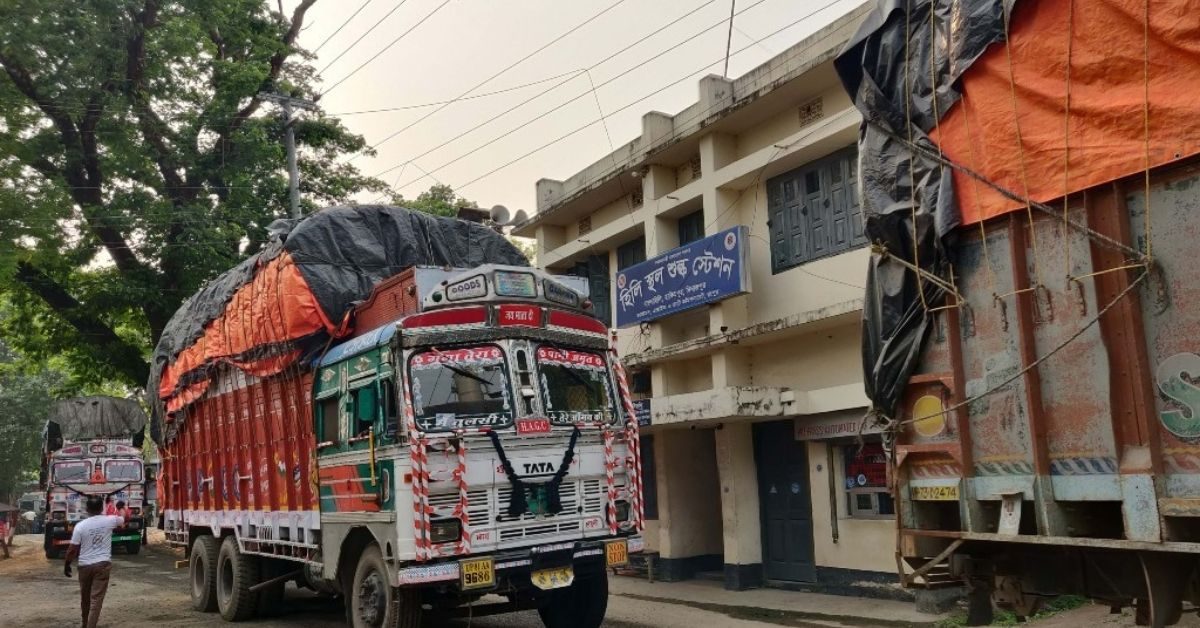On August 8, India exported 1,320 tons (approx. $378,000) of wheat to Bangladesh through its Integrated Check Post (ICP) at Agartala in the border state of Tripura.
The Land Ports Authority of India (LPAI) reported this as the largest ever consignment that has crossed ICP Agartala.
This development in trade was made possible due to the growing outreach between India and Bangladesh for improving connectivity.
During Prime Minister (PM) Narendra Modi’s visit to Bangladesh in March 2021, both countries had agreed to upgrade the land border crossing infrastructure.
In addition, PM Modi had requested that at least one major land port between both countries be free of port restrictions, starting with the ICP at Agartala.
Land border connectivity remains vital to India-Bangladesh economic relations.
Bangladesh is now India’s fifth-largest trading partner, and approximately 75% of this trade takes place through the land.
Most of this trade occurs through the four operational ICPs on the Indian side located at Petrapole, Agartala, Sutarkandi and Srimantapur, and their corresponding ports in Bangladesh.
Out of these, two ICPs (Agartala and Petrapole) have been formally inaugurated in 2013 and 2016, respectively.
The ICPs are entry and exit points on India’s land borders and house various facilities such as customs, immigration, border security, quarantine, among others, within a single facilitation zone.
These posts have superior infrastructure facilities as compared to other land ports.
The Government of India has planned to upgrade eight more land ports with Bangladesh to ICPs by 2025.
ICP’s benefits
Beyond their role in enabling bilateral connectivity, the ICPs are also an essential part of India and Bangladesh’s regional connectivity initiatives.
For instance, the ICPs are important gateways for the Bangladesh-Bhutan-India-Nepal Motor Vehicles Agreement (BBIN-MVA) particularly in corridors such as the Kolkata- Petrapole-Benapole-Dhaka corridor, which can further link with Nepal through the Kolkata-Raxaul-Birgunj-Kathmandu corridor.
Several other such routes for linking Nepal and Bhutan to Bangladesh have been identified.
Similarly, the ICPs are also an important part of the two countries’ multi-modal connectivity via inland waterways.
Therefore, it is pertinent to address several existing challenges at the land ports between India and Bangladesh that hinder seamless connectivity.
These challenges include lack of digitization at the land ports in both countries, port restrictions due to lack of cargo-handling infrastructure, especially on the Bangladesh side, lack of quarantine facilities etc.
The lack of a mirror ICP infrastructure in Bangladesh particularly creates barriers in trade, thereby affecting the ease of doing business.
I delve upon several recommendations to address these issues in a recent publication titled Linking Land Borders: India’s Integrated Check Posts.
First, the selection of land ports to be upgraded by both India and Bangladesh should be made to complement the other regional connectivity initiatives such as railways and inland waterways to pave the way for multi-modal connectivity.
For instance, India announced an ICP at Sabroom in Tripura to complement the recently inaugurated ‘Friendship Bridge’ between India and Bangladesh over River Feni.
Similar planning would enable better infrastructure connectivity between both countries.
Second, there is a need for ICP-like infrastructure facilities on the Bangladeshi side to ensure seamless cargo movement.
Bangladeshi traders made a request during the 4th Meeting of the Council for Trade Development and Promotion held in 2019 for India to create an ICP on the Bangladeshi side through a grant.
It would be prudent for the Bangladesh Land Ports Authority (BLPA) and the LPAI to jointly conduct a need assessment of the land ports and chart the way forward.
Finally, through its own experience, India can support Bangladesh in capacity building to ratify and implement the Transports Internationaux Routiers or International Road Transports (TIR) Convention.
Through this, the reciprocal recognition of customs control between signatory countries will obviate the need to inspect goods at the borders.
This will enable seamless cargo movement bilaterally between India and Bangladesh and for India’s transit of goods to its Northeast region.
Bangladesh is an important player in India’s regional connectivity agenda.
By improving the impediments in physical connectivity, both countries can capitalize on the economic potential of the growing bilateral and regional trade.
Riya Sinha is a research associate at the Centre for Social and Economic Progress, New Delhi
Source : Dhaka Tribune







